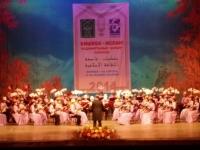Celebration Festivities of Bishkek as 2014 Islamic Culture Capital Kick Off

Dr Abdulaziz Othman Altwaijri, the Director General of the Islamic Educational, Scientific and Cultural Organization (ISESCO), the Minister of Culture, the Deputy Minister of Foreign Affairs, ambassadors, a host of Kyrgyz senior officials and a large number of Kyrgyz people were present at the ceremony.
The commemorative shield of the festivities offered to the President of the Republic was presented to the Minister of Culture who delivered an address at the opening of the ceremony. Afterwards, ISESCO Director General gave his address which was then followed by a cultural and artistic program.
Director General delivered an address in which he reminded the attendance that the event was part of ISESCO’s ten-year Program of Islamic Culture Capitals (ICCP), adopted by the fourth session of the Islamic Conference of Culture Ministers, held in Algiers in 2004, and updated by the conference’s sixth session held in Baku, Azerbaijan, in 2009.
He explained that the program was aimed at promoting Islamic culture and celebrating the cultural heritage of the celebrated cities, which, he said, were actually selected according to strict criteria, including, inter alia, their major contribution to culture, literature, arts, science and knowledge throughout their history.
Altwaijri pointed out that the ceremony came a few days after the close of the celebration of the Afghan city of Ghazni as the Asian Region’s Capital of Islamic Culture for 2013, and after the launch of Sharjah, in March, as the Islamic Culture Capital of the Arab Region for 2014, and coincided with the ongoing preparations to launch Ouagadougou, in June, as this year’s Islamic Culture Capital of the African Region.
He seized the occasion to stress that religious, ethnic, linguistic and cultural differences should in no way suggest a clash or conflict between civilizations or the supremacy of one over another, insisting that they should rather be understood as an opportunity for dialogue as advocated by the Quranic verse: “O mankind! We created you from a single (pair) of a male and a female, and made you into nations and tribes, that ye may know each other (not that ye may despise (each other). Verily the most honored of you in the sight of Allah is (he who is) the most righteous of you. And Allah has full knowledge and is well acquainted (with all things).” By the same token, he recalled that the Islamic civilization is based on mutual understanding and its relations with other civilizations have never been based on clash, exclusion or discrimination. In fact the teachings of Islam, which constitute the foundations of this Islamic civilization, have always advocated the single origin of the human race.
He then highlighted the importance of the selection of Bishkek as Islamic Culture Capital of this key part of the Muslim world thanks to its cultural heritage and to its contribution to the promotion of cultural diversity, coexistence and tolerance among cultures and religions.
Speaking of the organizational aspect of the event, the Director General said that ISESCO and the Ministry of Culture of Kyrgyzstan have taken all the necessary arrangements to prepare a year-long schedule as varied and comprehensive as would befit such an important event. The celebration program, as he said, features particularly a Regional Seminar for Asian Member States’ Media Professionals on Ways to Redress International Media’s Stereotypes on Islam and Muslims, and a National Training Session for Educators and Teachers on Raising Environmental Awareness through Environmental Education Programs. The celebration program also includes paying tribute to one of Bishkek’s figures of Islamic thought, sponsoring Islamic Heritage Days, and rewarding creative students, scientists, artists and craftspeople.
Source: ISESCO



